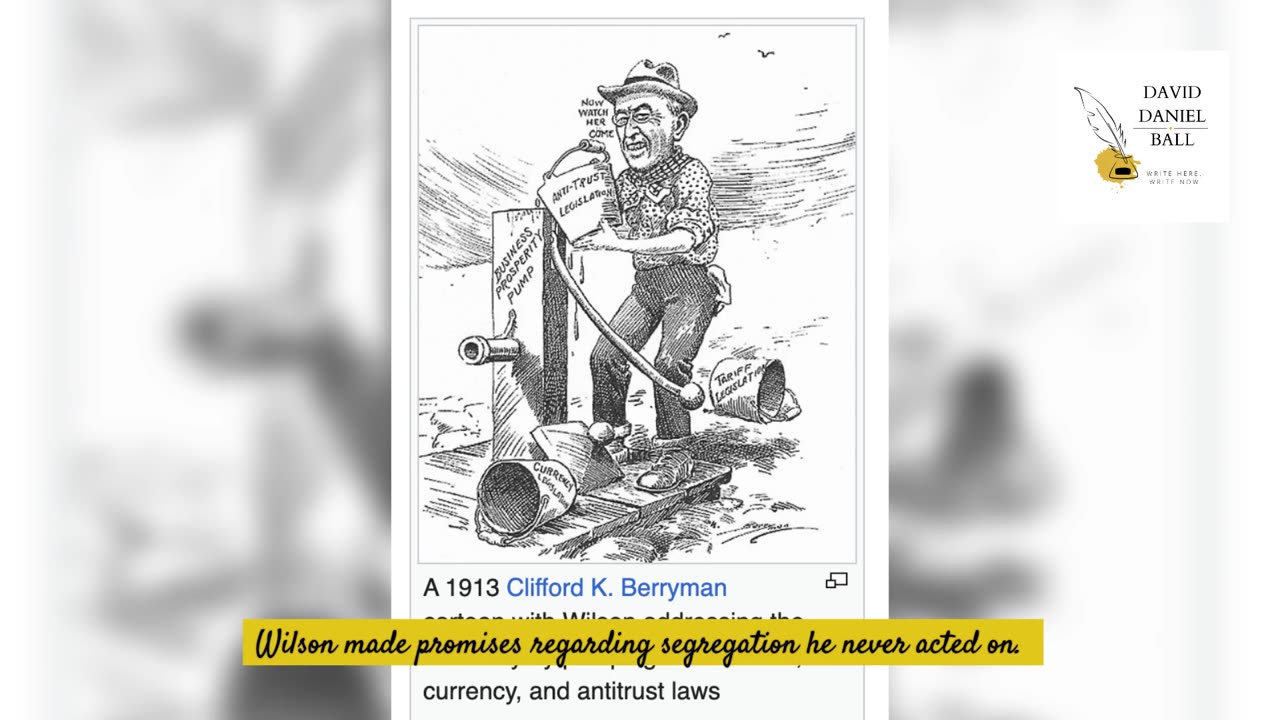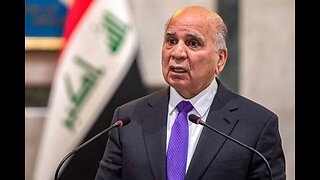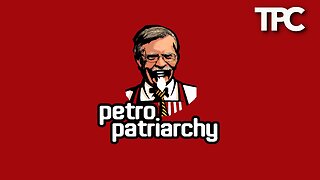Premium Only Content

Why Blacks Transitioned from GOP to Dem
Not a perfect documentary by me, I failed to show the mendacity of Moton. But the success of Wilson and FDR in exploiting Moton is undeniable
Pictory.ai made
=
Stealing the black vote from GOP
What were the reasons for African Americans transitioning from support for GOP to support for Dem? When did it happen? Who were the persons behind the transition? Was it a response to policy, or to a promise of policy? Had behaviour of Democrats to black people changed following the civil war? Had the behaviour of GOP changed to black people? Were there material benefits for black people from the shift in support?
It is racist to talk in terms of race. I was raised to dislike that. But not everything is as I might wish, historically. Modern America, pre Obama, was free. And compromised. More free, than arguably any nation before. But, compromised in ways she was too great to understand, collectively. America began in compromise, as people fought fiercely for competing visions. The two drafters of the constitution, Jefferson and Adams, adopted a Western Dialectic style, inventing party politics as we see it today. Jefferson was liberal, broad in vision, and facile, not doing so much as seeming. Adams was conservative and of a brand that differs from others. One has to make choices and not all conservatives make the same choices. In latter days, Reagan called his conservatism a big tent. The two writers had news organisations which supported each, against the other. On the day they died, fifty years after the signing of the declaration they wrote, they were friends.
America is a nation of friends whom often disagree vehemently. America is not always a house divided. But, she has two wings, not always on opposite sides. The division was from the beginning. But, we are going to start from the middle of the Civil War and move forward. When Lincoln ran the policy of emancipation through congress, every Democrat opposed it. So did some GOP. At war’s end, there was a period of reconstruction. Some Southern Democrats lawlessly opposed it. Friendly press excused atrocity.
40 Acres and a Mule
The black vote was firmly GOP following the civil war. GOP implemented policy to protect Blacks from Democrat led lynching, aimed at preventing former slaves from prospering. The so called policy of 40 Acres and a Mule was an ordinance placed by General William Sherman, whose ‘March to the Sea’ in Georgia encountered thousands of newly freed slaves. Following Lincoln’s assassination, President Johnson (a Democrat) repudiated the ordinance and gave any lands back to the confederates. The policy had been to allow former slaves to support themselves on their own land.
Compromise of 1877
In a familiar refrain to modern Presidential Politics, the election of 1876 saw GOP Rutherford Hayes facing Democrat Samuel Tilden. And the election outcome was unclear. Tilden won the the popular vote, but was one short of a majority of electoral votes, with 184. On 165 votes, Hayes waited on twenty slow counting districts, including Florida, Louisiana, South Carolina, and Oregon. To break the deadlock, a commission of 15, comprised of five from the Supreme Court, five from the Senate and five from Congress met to decide, awarding all 20 outstanding votes to Hayes. But there were conditions to the compromise. These conditions ended reconstruction and with it, protections given black peoples in the south.
Some would say that slow counting was the same as the Democrat trick in California of 2024. But, at issue in 1876 was the difficulty black peoples had in voting thanks to Democrat interference. Maybe the similarities are stronger, in that Democrats move today to disenfranchise citizens.
Booker T Washington
Booker was born into slavery in 1856. He worked salt furnaces and coal mines. He worked as a janitor to pay his tuition at Agricultural Institute. Later lecturing there. In 1881, at age 25, Booker was chosen to lead the new Normal and Industrial Institute in Alabama, called Tuskegee. He developed it into a successful college of higher education for African Americans. He was a key figure in the "Atlanta Compromise" speech of 1895, where he suggested that blacks should focus on self-improvement rather than civil rights agitation. "Character, not circumstances, makes the man."
Black peoples in USA faced adversity, but under GOP direction, prospered. So that black peoples formed communities, worked, ran businesses and, prospered. There was also adversity from Democrats and their branch, the KKK.
Woodrow Wilson
Wilson, as President, resembles Biden in terms of execution and corruption. A rank opportunist, Wilson benefited from Theodore Rooseveldt’s competition with Taft. Rooseveldt had passed the Presidency to Taft, but vehemently disagreed with policy. So in 1912, Rooseveldt created the Bull Moose Party and ran against Taft, splitting the vote for conservatives, and getting Wilson elected.
As President, like Biden, Wilson concentrated on building up his constituents at the expense of USA. As Europe imploded in war, Wilson campaigned on remaining out of the war. After re-election in 1916, Wilson sent in troops. It included segregated, black regiments. To observe the black troops, Wilson sent the new Principal of Tuskegee, Robert Russa Moton, who was unlike his predecessor, Booker Washington.
Robert Russa Moton
Moton (born 1867) was the grandson of an African slaver who was in turn, sold into slavery. Robert was born after slavery ended. He went to school at Hampton institute, upon graduating he lectured there. In 1891, he was made ‘Dean of Men’ and was called ‘Major.’ In 1915, Booker Washington died, and Moton became Principal of Tuskegee. As Principal, Moton was open to Wilson who sent him overseas to observe segregated black soldiers. Wilson made promises regarding segregation he never acted on. However, Moton was patronised by north American wealthy white patrons.
Moton was aware of Democrat abuse of power following Mississippi flood in 1927, but he used it politically to attack the civil engineer in charge, Herbert Hoover. This was a political position, where he demanded of Hoover what he never claimed from Wilson. Moton was invited to speak on race issues internationally, where he was segregated from other white speakers. Moton was instrumental in supporting Franklin Delano Rooseveldt by undermining Hoover’s credibility. In return FDR promised lots of things regarding segregation that he never delivered.
Herbert Hoover
Born in 1874, Herbert Hoover was a civil engineer, and one of the most brilliant to ever be President. He had worked in Mining in Australia, then China, inventing processes for mining Zinc still used today. In his day he was famous for being the civil engineer that fed Belgium during WW1, negotiating contracts between London and Berlin while they were at war. Hoover managed to prevent German theft of aid.
Following WW1, Hoover fed much of Europe. Hoover was apolitical, and worked with Democrats during WW1, and wasn’t trusted by GOP, but he ran for President as GOP in 1920. Harding won the election. Coolidge became President after Harding’s death. Hoover contributed greatly to the leanest administration in history. Hoover was not touched by corruption claims the corrupt Democrat lobby tossed the GOP way regarding the Teapot scandal. In 1927, Hoover fed Americans following the Mississippi flood disaster. It was then, that some corrupt Democrats robbed aid from Blacks at gunpoint. Politically naïve, Hoover was counselled to wait until he was President before redressing the corruption.
FDR
Born 1882, Franklin Delano Rooseveldt was a nephew to Theodore, but different, politically. Theodore had opposed corruption in New York, FDR ran Democrat holdouts. Money given to Moton from ‘white northeners’ likely came with FDR’s blessing. Capitalising on the tragedy of the great depression, FDR blamed it on Hoover and offered a ‘New Deal.’ The New Deal promised much for Moton and Blacks, but never delivered, as Booker had warned.
Aspirations of Black people
Following the Civil war, former slaves had had a dysfunctional society, without fathers for some families and with poor education attainment. In 1920s, Black peoples had been growing more prosperous. Since the New Deal, Black peoples have been poorly served by welfare, fractured families and loss of community institutions
-
 2:52
2:52
Current Affairs and world politics
3 months agoHeadlines Jan 14th 2025
711 -
 1:33:35
1:33:35
theoriginalmarkz
2 hours agoEvening News with MarkZ, joined by Jonathan Otto. 04/24/2025
5.09K3 -
 10:10
10:10
Mrgunsngear
1 hour agoNew Trijicon MRO SD - The Best American Made Red Dot Optic?
3052 -
 LIVE
LIVE
Game On!
11 hours ago2025 NFL Draft Live Coverage and Reaction!
248 watching -
 LIVE
LIVE
RamrodJenkins
3 hours agoOblivion Remastered! I am so excited to finally play this!
51 watching -
 LIVE
LIVE
Tommy's Podcast
1 hour agoE713: Lady Luck
97 watching -
 12:19
12:19
T-SPLY
7 hours agoDemocrats Start Economic War With El Salvador!
12K17 -
 13:42
13:42
SantaSurfing
5 hours ago4/24/2025 - Part 1 on Endless Frontiers Efficient & Powerful Tesla Homes! Revolutionary!
16.5K21 -
 LIVE
LIVE
VOPUSARADIO
7 hours agoPOLITI-SHOCK! "Destroying The Narrative"! W/ 3 Special Guests
54 watching -
 58:12
58:12
Donald Trump Jr.
4 hours agoInterview with CIA Deputy Director, Plus FBI's Major Maduro-TDA Discovery | Triggered Ep236
101K114